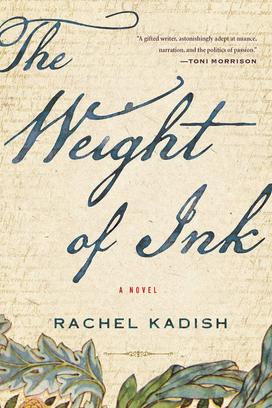Rachel Kadish ’91 Delivers a Historical Epic with The Weight of Ink

The author: Rachel Kadish ’91 is the award-winning author of the novels From a Sealed Room (Mariner) and Tolstoy Lied (Mariner) and the novella, I Was Here (Fancy Sisters Press). Her work has appeared on NPR and in The New York Times, Ploughshares, and Tin House. She lives in the Boston area.
Opening page: She sat at her desk.
It was a fine afternoon, but the cold sunshine beyond her office window oppressed her. In younger days, she might have ventured out, hoping against reason for warmth.
Hope against reason: an opiate she’d long abandoned.
Slowly she shifted the volumes on her desk. A dusty bilingual edition of Usque’s Consolação lay open. She ran the pad of one finger down a page, before carefully shutting the book.
Half past one — and the American hadn’t so much as telephoned. A lack of professionalism incompatible with a finding of this magnitude. Yet Darcy had said the American was his most talented postgraduate — and Darcy, perhaps alone among her colleagues, was to be trusted.
“Levy can help with the documents,” Darcy had said over the phone. “Glad to lend him to you for a bit. He’s amusingly ambitious, in the American sort of way. Thinks history can change the world. But even you should be able to tolerate it for three days.”
Recalling, Helen almost chuckled. Even you. Good for Darcy. He, evidentially, still thought Helen someone worth standing up to.
Three days, of course, was nowhere near the time required to make a true assessment. But it was something — far more time, in fact, than Helen had any right to. Only the Eastons’ ignorance of the usual protocols had prevented them from laughing her right out of their house when she’d announced she required further access to the documents. She’d dared ask no more, sitting there at the dark wooden table opposite Ian and Bridgette Easton — the sun from the windows lying heavily aslant the couple’s manicured hands, the towering mullioned windows casting bars of shadows and diamonds of light … and Helen’s own thoughts tumbling from what she’d just from what she’d just glimpsed.
Consultations like yesterdays’ weren’t unheard of, of course; people sometimes turned up old papers in their attics or at the bottom of handed-down trunks, and if they didn’t think to call an antiquities council they contacted the university and asked for the history faculty. Yesterday’s caller, though, had asked specifically for Helen Watt. Ian Easton: the name had meant nothing to Helen, though he said he’d been her student once, years ago.
Reviews: Kirkus Reviews says, “Kadish’s characters are memorable, and we’re treated to a host of them: pious rabbis and ribald actors, socialites and troubled young men, Mossad agents and rule-worshipping archivists. From Shakespeare’s Dark Lady to Spinoza’s philosophical heresies, Kadish leaves no stone unturned in this moving historical epic.”












No responses yet